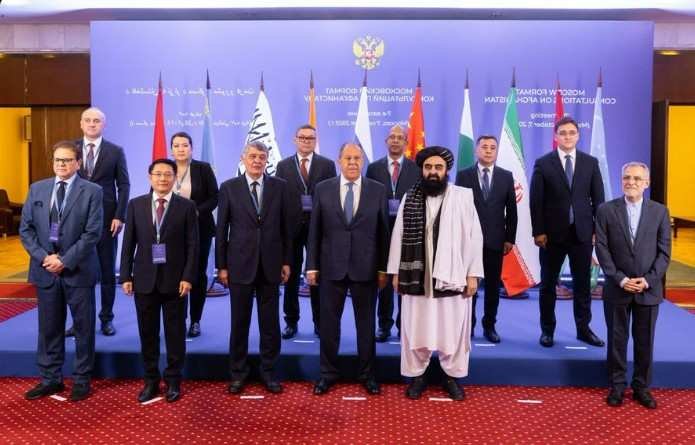India on Saturday came under fire after a press conference held by Afghanistan’s Foreign Minister Amir Khan Muttaqi at the Afghan Embassy in New Delhi featured exclusively male journalists, with no women allowed entry. Amid mounting public outrage and political pressure, the Ministry of External Affairs (MEA) clarified that the Indian government had “no role” in organizing or approving the guest list for the event.
Exclusion of Women Sparks Uproar
The presser on Friday drew attention not for what was said, but for who was absent: women journalists. Reports suggest that several female reporters, despite abiding by conservative dress codes, were reportedly prevented from entering the venue.
Social media quickly erupted with criticism from media professionals, civil society, and political leaders, who denounced the move as a blatant act of discrimination and a violation of journalistic freedoms.
“We Had No Involvement,” Says MEA
In its defense, MEA officials asserted that invitations for the press event were extended by Afghanistan’s Consul General in Mumbai to select journalists based in Delhi, and that the premises of the Afghan Embassy fall outside Indian jurisdiction.
The MEA statement stressed that the government did not influence the guest list or impose any restrictions on female journalists.
Opposition Slams Government’s “Silence”
The exclusion of women drew sharp condemnation from opposition leaders. Rahul Gandhi charged that allowing such exclusion signals weakness and undermines India’s commitment to women’s rights. He said, “When you allow the exclusion of women journalists from a public forum, you are telling every woman in India that you are too weak to stand up for them.”
Mr. Modi, when you allow the exclusion of women journalists from a public forum, you are telling every woman in India that you are too weak to stand up for them.
In our country, women have the right to equal participation in every space. Your silence in the face of such… https://t.co/FyaxxCteK6
— Rahul Gandhi (@RahulGandhi) October 11, 2025
Priyanka Gandhi Vadra demanded that Prime Minister Modi clarify his stance on the incident, asking how it was permitted in a country that holds women as its pride.
Prime Minister @narendramodi ji, please clarify your position on the removal of female journalists from the press conference of the representative of the Taliban on his visit to India.
If your recognition of women’s rights isn’t just convenient posturing from one election to…
— Priyanka Gandhi Vadra (@priyankagandhi) October 11, 2025
Former Union Minister P. Chidambaram argued that male journalists present should have walked out in protest the moment they realized their women colleagues were excluded. He called the incident “shocking.”
Trinamool Congress MP Mahua Moitra described it as a dishonour to every Indian woman, branding the government “spineless hypocrites.”
Diplomatic Reset Overshadows Controversy
Muttaqi’s visit to New Delhi marked a rare diplomatic engagement with the Taliban regime. During his meetings with External Affairs Minister S. Jaishankar, India announced that it would upgrade its mission in Kabul to a full-fledged embassy—a move seen as a step toward normalising diplomatic ties.
Jaishankar underscored India’s intent to support Afghanistan’s development and to safeguard its sovereignty and territorial integrity.
Still, critics say the optics of the press conference — held on Indian soil — have cast a shadow over New Delhi’s diplomatic stature and its purported commitment to gender equality. Some analysts have questioned India’s tacit tolerance of the Taliban’s restrictive gender policies, especially when the event took place in the capital.
Broader Implications
The Taliban’s systematic exclusion of women from public life has been well documented — from curtailing female education to banning women from public employment and limiting their rights in many spheres.
This latest episode, occurring outside Afghanistan, raises concerns about how the regime’s practices may be extended to diplomatic settings and international engagements.
In the wake of the backlash, calls are growing for stronger safeguards to ensure that international protocols respecting gender equality are upheld — not just in principle, but also in practice.








